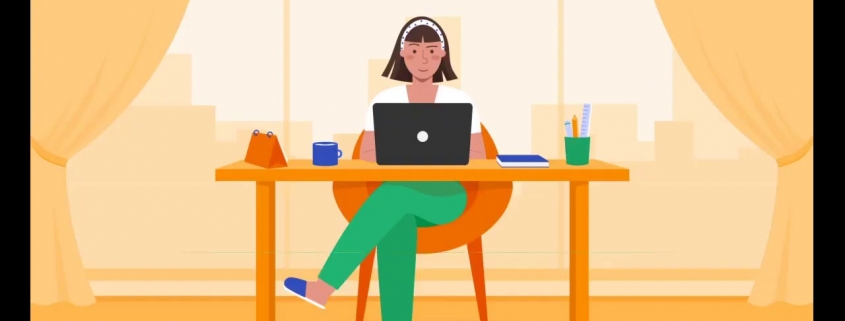Does Productivity Soar by Working from Home?
Amid the Covid-19 crisis, working from home has become the norm for many. But even as remote work has normalised, it’s a recent development: doing your job from your couch was less mainstream before the coronavirus – and even stigmatised.
“Have you punched into Google image search, ‘working from home’, and looked at the top 20 images? They’re basically naked people, a guy drinking champagne in what looks like a jacuzzi. I mean, almost none of them are positive images,” says Nicholas Bloom, a professor at Stanford University in California. He’s made a career out of studying work practices, including remote work. And he thinks the attitudes around working from home are finally changing.
“One silver lining with the Covid pandemic: it’s going to kickstart working from home [moving from the] fringe to a mainstream technology that is commonly used across the country,” he says. That process is already under way; firms including Fujitsu and Twitter have already announced plans to make remote work a permanent option, even after the pandemic.
A study done by Nicholas Bloom, professor at Stanford University, back in 2013 somewhat forecast this trend: in his experiment, Bloom worked with a Chinese company to study remote-work productivity. Somewhat to Bloom’s surprise, the company’s staff became notably more productive by working from home four days a week.
Now, six months into the global pandemic, an increasing number of companies are asking: should we work from home indefinitely? And if they do decide to make major organisational changes about remote work, could they see similar leaps in productivity?
How Do Knowledge Workers Spend Their Time?
In 2013, knowledge workers spent two-thirds of their time either “managing across” in meetings, often with many colleagues, or doing “desk-based work” on their own. Externally focused work (e.g. talking to customers), managing down (coaching and supporting subordinates) and managing up (interacting with the boss and other senior people) all got very little time, while training and personal development got almost none.
How has this picture changed during lockdown? There were two significant shifts: 12% less time managing across through meetings and 9% more time doing externally focused work. Desk-based work continues to take a third of our time. Other changes — a little less time managing up and a little more time on training and development — were not statistically significant.
Standing back, the evidence suggests lockdown has helped us more effectively prioritize our work. We still need to get through our emails and report-writing. But we are significantly less likely to get drawn into large meetings, and this leaves us more time for client or customer work and for training and development, which most people would argue is a good thing. However, lockdown doesn’t seem to have helped with hierarchy-spanning activities (managing up and down), presumably because it’s impossible to have the short, spontaneous meetings that used to be possible.
How Do Knowledge Workers Decide What to Do?
While most knowledge workers have a written job description somewhere, it is well understood that they take responsibility for choosing what to do and when to do it based on a variety of factors, including tasks outside of their formal role when it appears sensible to do so.
To get a sense for how these decisions are made, we asked study subjects to choose among four options for every activity: It’s a standard part of my job/my boss asked, a peer or colleagues asked me, I did it spontaneously, or it was important and I found time. In 2013, respondents said 52% of their activities were standard, 18% requested by a peer , 24% independent but important, and 3% independent and spontaneous. In 2020, we are still spending half our time on standard activities, but we are doing only 8% because a colleague asked, and a full 35% because we thought the activity was critical. Both these differences were statistically significant. Spontaneity rose to 6% but this difference was not statistically significant.
What’s going on here? It seems we have been taking more direct charge of our time during lockdown. Working from home gives us a bit of breathing space: We don’t have colleagues or bosses badgering us, and we don’t get drawn into meetings by force of habit, just because we happen to be around. The result is a reassuring increase in us making time for work that matters most to us.
Concerns and Challenges
Working in lockdown has helped us to focus and to take responsibility. But that’s not the whole story. Follow-up interviews revealed some of the areas of concern that we as individuals — and as leaders of others — need to understand.
Some respondents cited the potential for shirking: “I am worried there is some slackening of effort. People are starting to get a bit too comfortable working from home,” said one. In our view, this is not a huge problem: There are many ways of informally monitoring how much time your colleagues are putting in via Outlook, Slack and other tools, and we should really be evaluating knowledge workers on their outputs not their inputs anyway.
The bigger areas of concern were around the things people couldn’t do well in a virtual environment. Take managing across first: It’s not so hard for an existing working group to stay on course when working remotely, but the challenges of getting started on something new (the forming/storming stages of team development) or resolving internal conflicts are enormous. Of course, these activities can be done over Zoom – just not as well. Few people are energized by informal online get-togethers. As one person said, “We are slowly losing the social glue that holds us together.”
Managing up and down are no less tricky under lockdown. Most respondents had instituted regular one-on-one catch-ups with their teams and bosses, but they usually focused on immediate task and personal well-being issues, rather than longer-term development. They missed the opportunity to bottom out difficult issues: “You cannot challenge a person quite so well over Zoom. You tend to hold back,” said one. They also lamented the loss of growth opportunities for their teams: “I used to throw people into new assignments, where they learned on the job, watching and learning from experienced colleagues. That’s almost impossible to do in a virtual setting.”
Finally, some people worried about their own development. While time spent on self-education went up during lockdown, this was mostly due to online webinar and course attendance — which helps build knowledge but doesn’t encourage the active experimentation and personal reflection that help us really grow.
For many of us, the new socially distanced mode of working may continue for some time. The good news for knowledge workers from the first phase of this experiment is that lockdown has helped us better manage and prioritize our schedules to favor the most value-added work. The challenge — as we move into the next phase where some face-to-face meetings are allowed — will be to bring back the informal and social elements of office life that are so vital to organizational and individual success.
Given our current situation knowing that your colleagues or employees are best suited for this new scenario we find ourselves in. Finding the right talent, the best fit for the job and your organisation can be a very challenging task. It is now important to find out whether your managers or your team is well-equipped of working together from various locations. It requires deep knowledge of their personalities, strengths, weaknesses, interests, work style and other characteristics. Our technology and solutions will do the work for you, helping you discover if your people are resilient during times of hardship, if they are autonomous, if they are team players, without actual human contact. Given that our platform is cloud-based, everyone can use it from home as well. Humanity finds itself at a crossroad for various reasons now, why not help people discover and develop themselves from the comfort of their own homes?
Request a free demo:

Sources:
https://www.bbc.com/worklife/article/20200710-the-remote-work-experiment-that-made-staff-more-productive
https://www.techrepublic.com/article/study-working-from-home-means-more-time-on-computers-but-workers-arent-more-productive/
https://hbr.org/2020/08/research-knowledge-workers-are-more-productive-from-home?ab=hero-main-text











